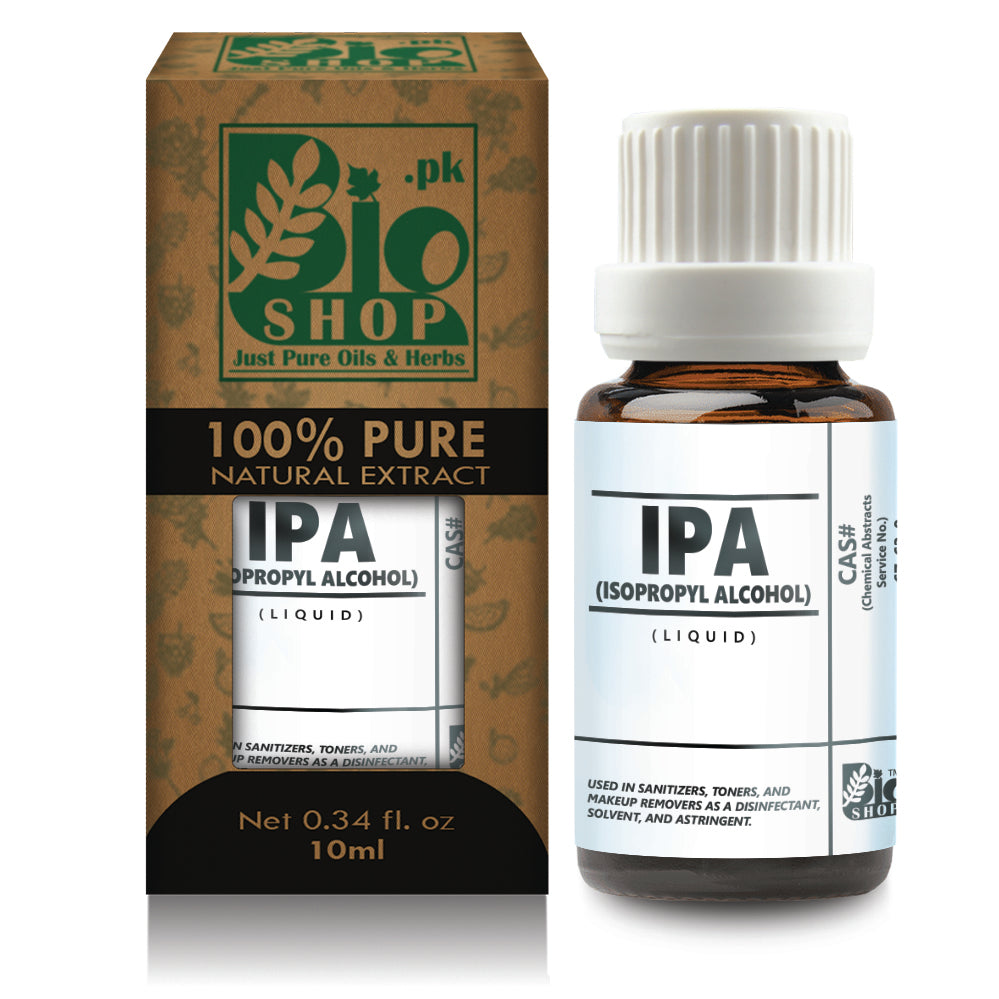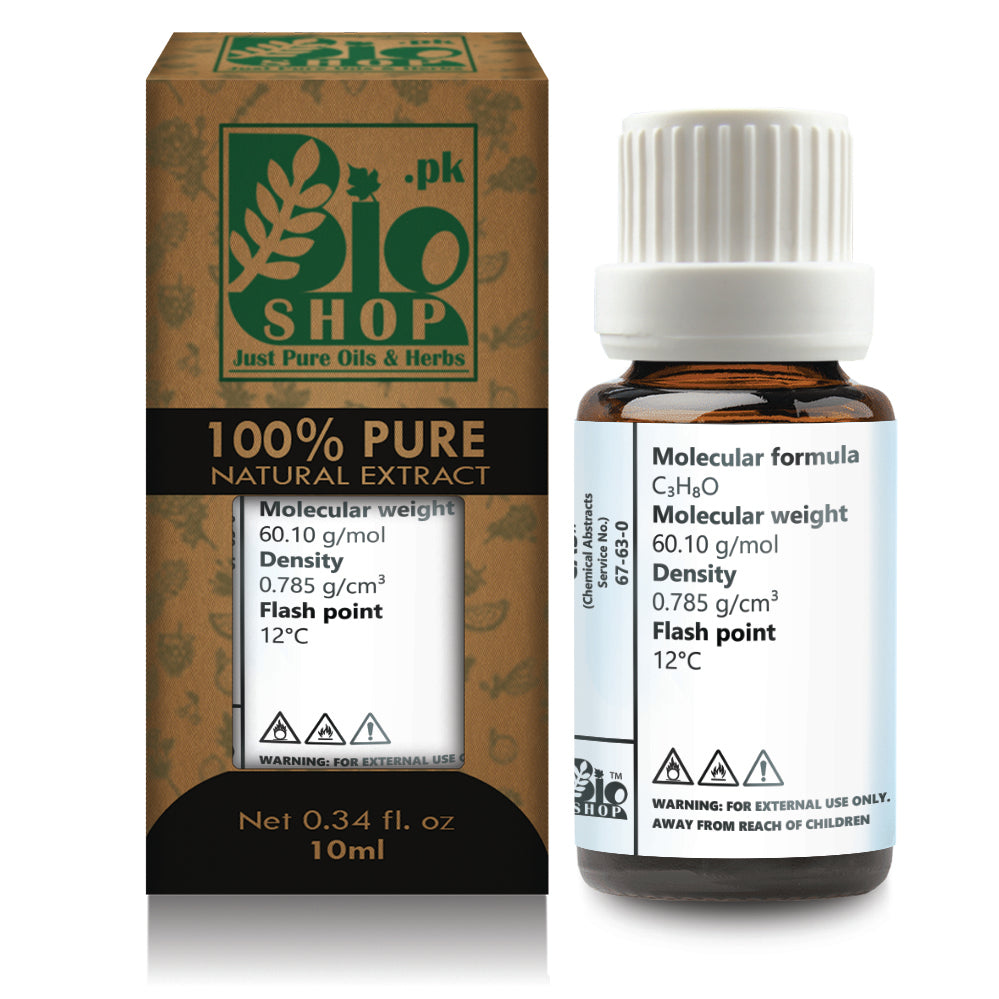Bio Shop
Isopropyl Alcohol (IPA)
Isopropyl Alcohol (IPA)
Key Functions: Acts as a solvent, disinfectant, degreaser, and evaporation control agent in cosmetics and personal care products.
Couldn't load pickup availability
Explore
Information About Isopropyl Alcohol (IPA)
✅ Key Features
- Powerful solvent for actives, oils, and resins
- Used as carrier and fixative in perfume and body spray formulations
- Evaporates quickly, leaving no residue
- Antibacterial and antifungal – ideal for sanitizers and cleaning
- Helps control viscosity and drying time in emulsions
🔬 Description
Isopropyl Alcohol (IPA) is a clear, colorless, volatile alcohol widely used in the cosmetic, pharmaceutical, and industrial sectors. In cosmetics, it acts as a powerful solvent, disinfectant, and viscosity reducer. It’s essential in perfumes, sanitizers, lotions, and aftershaves, helping to dissolve oils, control texture, and provide a quick-drying finish. IPA evaporates rapidly, leaving no residue, making it ideal for clean beauty tools and DIY spray formulations.
📊 Technical Data
INCI Name: Isopropyl Alcohol
CAS Number: 67-63-0
Solubility: Miscible with water and alcohols
Add Phase: Water phase or final phase depending on formulation
pH Stability: Stable across all cosmetic pH ranges
Processing Temperature: Use under ventilated, low-heat conditions
Appearance: Clear, colorless liquid
Odor: Characteristic alcohol odor
Molecular Formula: C₃H₈O
Molecular Weight: 60.10 g/mol
Flash Point: ~12°C
Density: ~0.786 g/cm³
Chemical Type: Short-chain alcohol / Solvent / Antiseptic
Functional Groups: Hydroxyl (-OH)
Primary Cosmetic Uses: Solvent, sanitizer, viscosity reducer, dispersant
🧪 Recommended Usage
- Usage Rate: 5% – 70% depending on purpose
- Phase: Add to water phase or after emulsion
- Ideal For: Sanitizers, Perfumes, Sprays, Lotions, Makeup Removers
💡 Pro Tip
💨 Use 99% Isopropyl Alcohol to disinfect cosmetic packaging, lab tools, and droppers before making DIY formulas. It dries fast, leaves no residue, and helps keep your creations clean and safe!
👩🔬 Skin Type Compatibility
⚠️ Suitable for oily, acne-prone, or targeted cleansing only.
❌ Not recommended for dry or sensitive skin in high concentrations.
✔️ Safe in properly formulated products with moisturizers.
🧴 Formulation Ideas
1. Alcohol-Based Hand Sanitizer
Formulate with 70% IPA, 0.5% hydrogen peroxide, 2% glycerin, and water — WHO-recommended base.
2. DIY Perfume or Body Spray Base
Use 80% IPA with essential oils, fragrance oils, and a solubilizer like Polysorbate-20 for quick-drying sprays.
3. Brush Cleaner Spray
IPA + distilled water + mild surfactant = perfect tool cleaner for makeup brushes and droppers.
4. Aftershave Splash
Combine IPA with witch hazel, menthol, and allantoin for a refreshing, pore-tightening aftershave.
5. Cleaning Agent for Lab & DIY Tools
Use 99% IPA to disinfect spatulas, bowls, droppers, and packaging — fast-drying and residue-free.
💧 Cosmetic Suitability:
Rated by performance, solvent power, and safety in various formulations.
Serums
⭐⭐☆☆☆ – Fair
🟧🟧⬜⬜⬜ – Use only for fast-drying serum bases or spot treatments.
Creams & Lotions
⭐⭐☆☆☆ – Fair
🟧🟧⬜⬜⬜ – Used in small amounts to enhance drying and penetration.
Toners
⭐⭐☆☆☆ – Fair
🟧🟧⬜⬜⬜ – Effective for oily skin but drying if overused.
Face Masks
⭐☆☆☆☆ – Poor
🟥⬜⬜⬜⬜ – Not suitable for leave-on masks.
Cleansers
⭐⭐⭐☆☆ – Moderate
🟧🟧🟧⬜⬜ – Useful in makeup removers or spot-cleaning gels.
Hair Masks
⭐☆☆☆☆ – Poor
🟥⬜⬜⬜⬜ – Drying effect; not used in conditioning formulas.
Deodorants
⭐⭐⭐⭐☆ – Good
🟩🟩🟩🟩⬜ – Effective in natural spray deodorants.
Eye Creams
☆☆☆☆☆ – Not Suitable
🟥⬜⬜⬜⬜ – Too drying and irritating for the eye area.
Shampoos
⭐☆☆☆☆ – Poor
🟥⬜⬜⬜⬜ – May damage hair and scalp in rinse-off products.
Soaps
⭐⭐☆☆☆ – Fair
🟧🟧⬜⬜⬜ – May be used as an alcohol boost in clear soaps.
Conditioners
⭐☆☆☆☆ – Poor
🟥⬜⬜⬜⬜ – Not used due to dryness.
Lip Balms
☆☆☆☆☆ – Not Suitable
🟥⬜⬜⬜⬜ – Highly drying for lip use.
Body Butters
⭐☆☆☆☆ – Poor
🟥⬜⬜⬜⬜ – Avoid in anhydrous body butter systems.
❓ FAQs
Q1: What is the difference between IPA 70% and 99%?
A1: 70% IPA is ideal for disinfection (water slows evaporation for contact time), while 99% is used for quick evaporation or dilution.
Q2: Is Isopropyl Alcohol safe for skin?
A2: In small, controlled amounts — yes. However, overuse can strip natural oils and cause dryness.
Q3: Can I use IPA in perfumes?
A3: Yes, IPA (usually 90%+) is widely used in body sprays and perfumes to dissolve fragrance oils and provide quick-dry effect.
Q4: Is IPA flammable?
A4: Yes. Store in cool, ventilated areas away from flames or high heat. Flash point is ~12°C.
Q5: Does IPA need a preservative?
A5: No. IPA is antimicrobial on its own, so it doesn't require an added preservative.
📂 Documentation
Upon request, we will provide.
Where Can You Safely Use Isopropyl Alcohol (IPA)
Discover how Isopropyl Alcohol (IPA) performs across different products — rated for safety, stability, and effectiveness.





